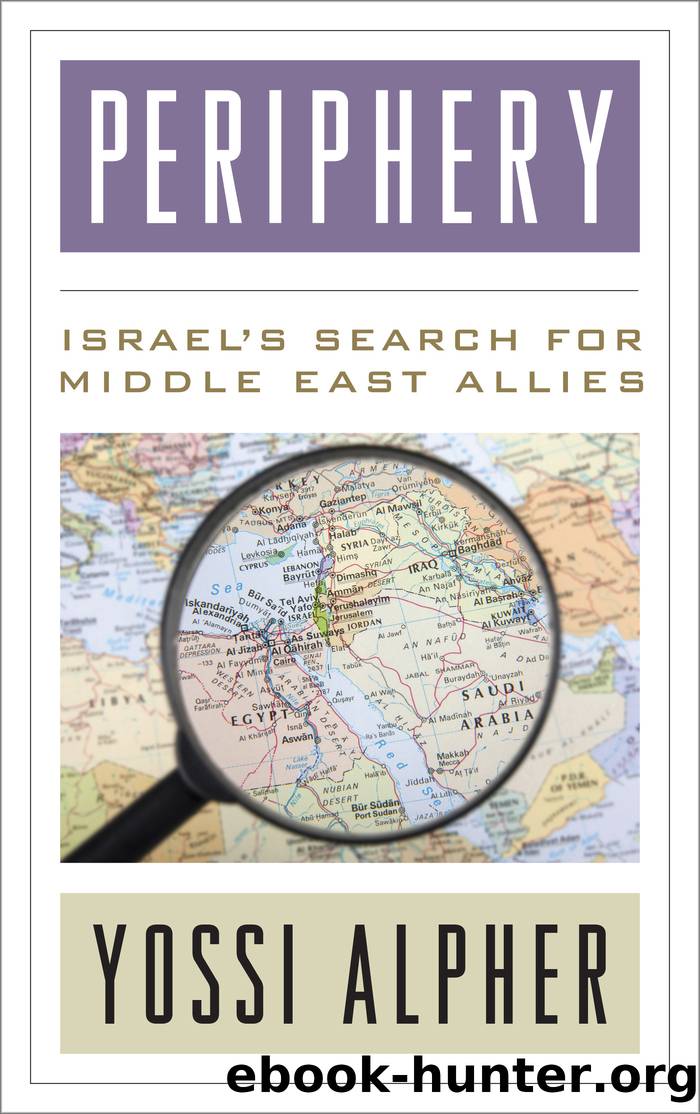Periphery by Alpher Yossi;

Author:Alpher, Yossi;
Language: eng
Format: epub
Tags: undefined
Publisher: Rowman & Littlefield Unlimited Model
Published: 2012-11-15T00:00:00+00:00
II
Ramifications
Chapter 10
Iran
Periphery Nostalgia and Its Costs
Israelâs close strategic alliance with Iran ended in 1979 with the fall of the shah and the creation of the Islamic Republic. This chapter looks at the inclination since 1979 on the part of significant Israeli policy makers to view the Islamic Republic and its prolonged hostility toward Israel as a temporary phenomenon, not representative of the true Iran and its interests, and accordingly, to argue that the Tehran regime can be bought off or undermined by Israel through subterfuge, propaganda, arms sales, and any other means available.
We argue that to the contrary, since 1979 there has been no objective basis for assessing that the regime in Tehran is fragile and can easily be toppled, that it can be persuaded to reconcile with Israel, or that if the regime does fall, it will be replaced by an alternative establishment that is friendly to Israel. While the Islamic Republic displays numerous intolerant and violent tendencies that have produced many dissidents, it has survived a prolonged war with Iraq during the 1980s and more recently, heavy international sanctions. Judging by Iranian elections, the majority of Iranians appear to support at least the idea of the regime, which has struck deep institutional and cultural roots. Predictions of the regimeâs imminent demise appear to be expressions of wishful thinking, inspired largely by well-meaning dissidents and in the case of Israel, by periphery nostalgia derived from ignorance.
Periphery nostalgia is the presumption that because Iran has historic tensions with the Arab world and because one Iranian regime, that of the shah, seemingly aligned itself strategically with Israel over the course of two decades, this pattern of alliance and shared strategic interests must through some form of historical determination or strategic norm, continue to manifest itself in Israelâs relations with Iran. The periphery nostalgia approach toward Iran has caused Israel repeated damage at the strategic level.
Dan Eldar, a former senior Mossad analyst, explains that this phenomenon has not been confined to Israel:
Intelligence and academic experts outside of Iran adjusted slowly to the change that took place there. For many years their thinking and analysis failed due to the shock of surprise and helpless anger over their failure [to anticipate the revolution] and due to intellectual and mental difficulties in âdigestingâ the Islamic revolution. These failings found expression . . . in a strong desire, sometimes conscious and sometimes not, to turn back the wheel of history. The hope to quickly restore the Shahâs regime resonated negatively on the intelligence assessment regarding Khomeiniâs Iran. Intelligence consumers/decision-makers sought in the early days of the Islamic Republic an assessment that would limit its days and announce the first glimmer of the near return of the Shahâs regime.[1]
Download
This site does not store any files on its server. We only index and link to content provided by other sites. Please contact the content providers to delete copyright contents if any and email us, we'll remove relevant links or contents immediately.
| Arms Control | Diplomacy |
| Security | Trades & Tariffs |
| Treaties | African |
| Asian | Australian & Oceanian |
| Canadian | Caribbean & Latin American |
| European | Middle Eastern |
| Russian & Former Soviet Union |
The Secret History by Donna Tartt(18096)
The Social Justice Warrior Handbook by Lisa De Pasquale(11944)
Thirteen Reasons Why by Jay Asher(8425)
This Is How You Lose Her by Junot Diaz(6414)
Weapons of Math Destruction by Cathy O'Neil(5803)
Zero to One by Peter Thiel(5467)
Beartown by Fredrik Backman(5320)
The Myth of the Strong Leader by Archie Brown(5219)
The Fire Next Time by James Baldwin(4998)
How Democracies Die by Steven Levitsky & Daniel Ziblatt(4943)
Promise Me, Dad by Joe Biden(4900)
Stone's Rules by Roger Stone(4836)
100 Deadly Skills by Clint Emerson(4671)
Rise and Kill First by Ronen Bergman(4537)
A Higher Loyalty: Truth, Lies, and Leadership by James Comey(4535)
The David Icke Guide to the Global Conspiracy (and how to end it) by David Icke(4363)
Secrecy World by Jake Bernstein(4360)
The Farm by Tom Rob Smith(4311)
The Doomsday Machine by Daniel Ellsberg(4234)
